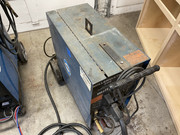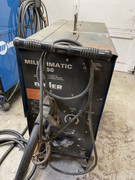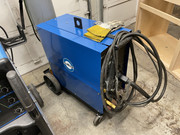Go  | New  | Find  | Notify  | Tools  | Reply  |  |
Member |
From the 2 below threads: https://sigforum.com/eve/forum...20022184&f=320601935 https://sigforum.com/eve/forum...80056784&f=320601935 I've decided against going the 3rd party route & going to stick with DIY. My dad has multiple welders (stick, MIG, Flux Core) but lives a bit over an hour away. I believe his MIG is a MAC Tools branded machine, not sure whose base mfg it is. Had thought about either getting him to haul his MIG rig down here, or take my chassis up to his place to get the welding done on it. Have also thought about investing in my own MIG setup, figure it would be useful in the future with this build, and wouldn't necessitate waiting on someone else to be able to make forward progress, and in the event there's a part that needs added or changed it would be a lot easier to just have my own equipment. I've done a bit of MIG welding before, but don't really know which brands to look for/avoid. I know Miller & Lincoln are some of the bigger names I've seen, but also likely out of my budget as a hobbyist level user. In the same vein, I don't want to go cheap & get a unit that isn't going to perform well. So, with that in mind, and no idea on what a decent budget would be for one, what should I be looking at? The Miller units seem to run near $1k to start, and that's a bit more than I'd like to spend, if I go this route. I also realize I'll need to budget for gas & safety gear as well. I don't have 220v in the garage, and would prefer to not have to run a new circuit if I can avoid it, so that leaves 110v options as the primary. The Enemy's gate is down. | ||
|
quarter MOA visionary |
I am far from qualified to offer welding advice, in fact I am a shitty welder aka inexperienced. However, I always wondered that if my 120v Hobart unit is a contributing factor. Not because the brand because it has worked flawlessly but because it is only 120v and my garage only has a 15 amp circuit? I have a hard time getting welds to stick on thicker material and welding dissimilar sizes. Learning to weld "well" is very similar to play golf "well". Hobart handler 125 is what I use (also use gas)  | |||
|
Member |
The Hobart Handler 140 was recommended on the Locost forum, not sure the differences between it & your 125. In my case, the majority will be on the chassis, at least to begin with. I had not heard of Hobart in this application, I'd only ever seen the brand in commercial kitchen equipment. I figure with a small unit like that. Building a welding cart could be a good first project, before jumping in on the Rotus chassis. The Enemy's gate is down. | |||
|
quarter MOA visionary |
Northern Tool has both so you can compare. Mine is on a cart with a flux gas bottle on the back. Like I said it works flawlessly but I need to practice more and maybe a better helmet to see my work better. | |||
|
| Member |
I've been happy with my Titanium (harbor Freight) 140 (120v/240v) welder. Flux core, Mig or spool gun (if you purchase a spool gun). It's a DC inverter rig. Wire speed, voltage and inductance adjustments. Nice long ground lead and whip. Lots of youtube vids reviewing it and all are positive. I reject your reality and substitute my own. --Adam Savage, MythBusters | |||
|
Fourth line skater |
I would give your local brick and mortar guy a shot. They will service what they sell if you have a problem. For a hobby 110v machine I have a couple of tips. The problem with these machines is a shorter duty cycle so take it easy on them, and find a 30amp circuit in your house. Usually the outlet near your washer and dryer. Plug in there with the thickest cord you can buy. The bottle neck with these smaller hobby machines is input. If you plug into a normal household 15v circuit you are going to have nothing but trouble. _________________________ OH, Bonnie McMurray! | |||
|
| is circumspective |
^^^ I too bought the Titanium 140. So far, so good. I was able weld 3/16" on 120volts fairly well. I'm going to add a 240v 30amp circuit in my garage. I got it to add expanded metal to the sides of my trailer. That will be done with 120v. I'll let you all know how it goes. "We're all travelers in this world. From the sweet grass to the packing house. Birth 'til death. We travel between the eternities." | |||
|
Member |
Thanks for the tips gents. I'll have to see what my garage amperage is & possibly look at adding a circuit if needed. Stepdad is an electrician, so I can get that done relatively easily, but they live near Vegas, so would have to be when they're in for a visit.
Luckily, there's a NT on 45N on my commute home, easy to stop in. May give Conroe Welding Supply a look, over on 59N. Maybe I can get some sort of pkg deal getting everything in 1 place. The Enemy's gate is down. | |||
|
| Just because you can, doesn't mean you should |
Before you go to the effort to take your chassis to your dads, I would suggest taking a few samples of scrap material like you would be welding and try out his machine and your skills. Then reevaluate your plan based on what you see and experience. I do TIG welding in my business on almost the exact type of project you are doing (chassis, suspension and misc. fabrication). The process, budget and necessary quality requirements are much different and I don't know your present skill level or how quickly it will take you to learn. MIG welding is also a much faster process than what I do. After you have tried some different type of welds, you will be in much better shape to answer that question yourself and for any of us to give good advise on equipment needs. Fair warning, this type of adventure could easily cause a never ending craving for more tools and equipment. ___________________________ Avoid buying ChiCom/CCP products whenever possible. | |||
|
| Three Generations of Service  |
Do yourself some favors: 1. Run the extra circuit and get a 220 machine. 2. Spend the money on a Lincoln or a Miller. Hobart a distant third IMO, but better than anything Horror Fright or Northern Tool will sell you for a house brand. 3. Go gas. Flux core is okay (with lots of practice) for thin stuff but you're betting your life on these welds. 4. Pursuant to #3, Practice, Practice, Practice! The downside of starting out with MIG is that it'll lay a visually pretty weld that won't hold due to lack of penetration. Run it hotter than you think is necessary and then break/cut open the weld to check for penetration. Be careful when following the masses. Sometimes the M is silent. | |||
|
McNoob |
I use a Hobart 140 with gas. I an am amateur metal worker that does DIY projects. My first project was to build a welding cart. I built my own offset smoker. Here's a few things I've learnt: Go with 220 if you can. Metal working is an expensive hobby   "We've done four already, but now we're steady..." | |||
|
Quit staring at my wife's Butt |
I picked this millermatic 200 up on a craigslist ad for 400 bucks it looked rough at first but after I welded with it I knew it was going to be great machine, the older miller machines weld like no other. first thing I did was remove all the skins cleaned all the dust out of the inside did a repaint and decal and now I have one of the best wire machines you can get. I have been welding with it for 6 months without any issues. before and after pics.    | |||
|
Member |
Well, just looked at my elec panel. Not sure adding a 220 circuit can be done with the existing equipment. Main box if completely full Sub-panel (100amp/dual 50 from the main panel) (primarily pool equip) only has 1 single space available. Will obviously have a qualified electrician look at it if I do proceed down that route, as it's well outside my DIY wheelhouse. Luckily, the panel is on a shared wall with the garage, so no long runs if I pull the trigger on it. Would need to chase it, but have 3 breakers in the main panel labelled for the garage. 2 15amp (single bay) & 1 20amp (split, dual 20a in a single bay breaker). Guessing if I went 110 machine, I'd want to run it on the 20a circuit. The Enemy's gate is down. | |||
|
Quit staring at my wife's Butt |
With 110 volt you're going to be very limited to how thick you can weld unless you spent $ for an inverter machine. | |||
|
| Member |
Have an electric dryer outlet reasonably near the garage? I've brought my mig welder over to two friends houses, put together an 30' extention cord with SOOW 10/3 cord and proper plugs. Plugged it into their 220V dryer outlet. Go with gas. XLT, killer deal on the Miller 200. | |||
|
Member |
Yes, the dryer is immediately inside the garage door to the house, suppose I could run off of that. Possible to extend it & put in a 220v outlet in the garage on the same circuit? Would be about a 3ft run from the 220 box in the laundry room, to the garage wall. The Enemy's gate is down. | |||
|
| Member |
With the dryer immediately inside the garage door use that outlelt with and extension cord for now to get you going. When your stepdad pays a visit put in a dedicated outlet in the garage. That cord won't go to waste other then the dryer plug. I occasionally need an extension cord when welding a large project. 220V and gas is the way to go. | |||
|
| Member |
| |||
|
| Member |
I am not an electrician and don’t know the electrical code so get competent advice before doing this. However, I have seen a LOT of breaker boxes where due to remodels, additions, etc., they needed to add more circuits to an already full panel. As long as the panel can accommodate them, moving some existing circuits to tandem/half height circuit breakers (basically two breakers in one breaker slot) can make room for more circuits. | |||
|
Member |
^ Good to know. There's a few tandem breakers already present. Will keep that in mind if/when things progress. The Enemy's gate is down. | |||
|
| Powered by Social Strata |
| Please Wait. Your request is being processed... |
|
© SIGforum 2025